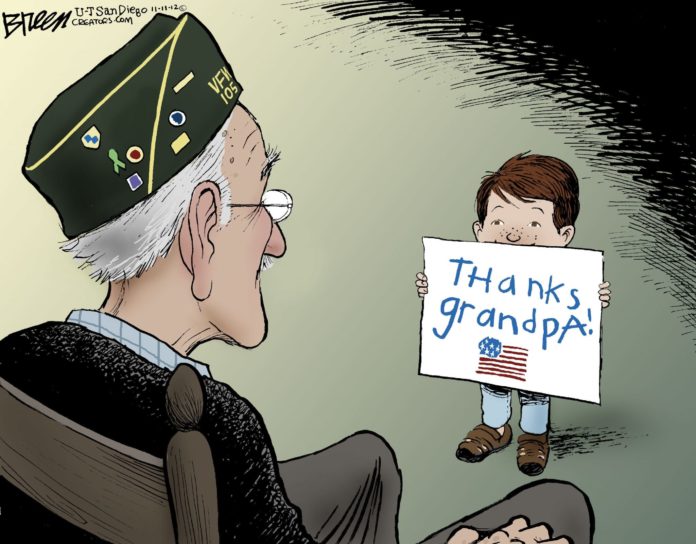BY VERN TURNER
 In my childhood I met many of my father’s friends who fought in World War II. Some walked with a limp. Some had scars on their bodies. All of them had scars in their minds.
In my childhood I met many of my father’s friends who fought in World War II. Some walked with a limp. Some had scars on their bodies. All of them had scars in their minds.
As a curious kid I asked them about their war experiences and they were very patient to tell me stories, but were not too graphic. I discovered the truth later.
A very good friend of my parents had been a Marine on Pelilieu. He managed to survive, but earned a Purple Heart and a chest full of other medals in the process. Someone writing about that battle many years later mentioned this Marine by name in his book and I almost jumped out of my chair. I had no idea that Pelilieu was such a horror show. This Marine never went into the details with me.
But another Marine from that era did get into details. He was married to a nurse at the defense plant where my father worked. This Marine spent the entire war in the South Pacific with raider groups like today’s Recon outfits. His stories were brutal and horrible leaving a kid like me in tears and trembling. I had the bad dreams that night.
This Marine suffered for years after the war with what we now call Post Traumatic Stress Disorder. He would wake up screaming and throw his wife around the room. They had to sleep separately until his dreams diminished. Nobody knew how many of our troops suffered so from this kind of debilitation.
The guy who helped my father coach my Little League team was also a Marine and served on a destroyer during the battle of Okinawa. He showed us a piece of the Japanese airplane that crashed into his ship and gave him HIS Purple Heart.
Yet another Marine who walked with great difficulty told me how he broke his back crashing his shot-up Corsair onto the deck of a carrier.
To an easily influenced kid these guys were my instant heroes. I’d seen all the John Wayne movies of the era and I bought the glory of the fighting man Hollywood so eagerly sold us. Every one of the men mentioned above took me by the lapels, figuratively, and told me otherwise. They despised Hollywood for cheapening their duty and glorifying their experiences.
Even the heroes didn’t feel like heroes. They just wanted to stop killing. They just wanted the war to end. Then, 5 years later, we got Korea.
The ultimate point of this piece is not to just heap still more appreciation on men and women who have sacrificed up to and including their death in the line of duty, but to question why we have so many veterans and why so many have the Combat Infantry Badge on their tunics?
The Korean conflict was an extension of World War II in that the northern Korean political environment compelled those in charge to invade South Korea to gain favor from China after the Soviet Union shunned their plans to unite the divided country. The United States was the only western country with enough military capability to hold off this “communist invasion” at that time.
Our reaction, in view of the advent of the cold war, was to fight the communist invasion. It is true that Joseph Stalin was more interested in spreading his rule than world peace and with the enormous military machine he built to defeat Germany, he announced his presence with authority everywhere he could in Europe.
Harry Truman was our President in 1950 when the North Koreans crossed the 38th parallel to invade the South. In the winter of 1940, Sen. Harry Truman, D-MO, acting on complaints from his constituents, discovered gross waste and neglect among contractors building facilities and weapons for the government. In 1941 he formed and chaired The Special Committee to Investigate the National Defense Program.
By 1944, this watchdog group saved over $15 billion in wasted effort and rooted out defective products in order to help the war effort become more streamlined and honest.
Big business got very, very rich from the war. Seventy-one percent of the government contracts went to the top 100 businesses in the country while smaller businesses had to scramble to become at least sub-contractors. The infamous “cost-plus” contract arrangement allowed businesses to inflate the cost of building something while tacking on the automatic profit. The Truman Committee eliminated the worst of those abuses and policed the contractors.
The merry-go-round between wars and industry is what President Eisenhower warned us about in 1960, but we’ve ignored the warning. The military-industrial complex does influence policy. We as a nation seem to exist for war.
The Middle East claimed American troops’ lives in every decade of my life. Vietnam cost us almost 60,000 troop deaths and hundreds of thousands more injuries. Iraq and Afghanistan have been our most recent adventures in military action against enemies resembling ancient tribes with modern weapons instead of traditional combat units. Another 6,000 deaths and tens of thousands more injured and maimed are the results to date.
Communism was never going to be a political influence here, so why did we fear it so? Perhaps the capitalist moguls were afraid of the influence that populace-based philosophy would have on the working classes irrespective of its political influence.
Why do we spend more money than the next 20 industrialized nations combined on defense and security? We aren’t being invaded so our sovereignty isn’t being threatened. We still own the world’s most dominant economy. But that economy needs resources, most importantly oil. The oil we want and need is under the ground of countries where the people have been fighting Western hegemony for over 1,000 years. There’s the rub.
If our business people were so good at striking deals, why don’t they negotiate deals for resources without having wars? Why don’t we make the Afghans an offer they can’t refuse for their iron, lithium and copper? Why is blood part of the bargain? Is it cheaper than negotiation?
The concept of having fewer veterans of combat to celebrate is more appealing to me than having more of them. Then, I’m a selfish, jingoistic American who happens to like his fellow countrymen and wants them to lead peaceful, productive lives so that we, as a nation, can drive the future for the betterment of all mankind and the environment that supports us.
– Vern Turner is a regular contributor to The Oklahoma Observer. He lives in Marble Falls, TX, where he writes a regular column for the River Cities Daily Tribune. He is the author of three books – A Worm in the Apple: The Inside Story of Public Schools, The Voters Guide to National Salvation and Killing the Dream: America’s Flirtation With Third World Status – all available through Amazon.com.








